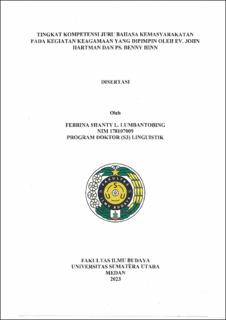| dc.description.abstract | Educational background and knowledge do not guarantee the competency of interpreters or the success of interpretation activities. However, competency in this field is essential to enhance interpreter performance. This phenomenon underlies the implementation of research in the field of interpretation. This study aims to measure the competency level of two community interpreters in religious activities, focusing on aspects such as (1) knowledge mastery, (2) interpretation skills applied by each interpreter, (3) work attitude during interpretation activities, and (4) behavior when conducting interpretation in religious activities. The research method used is qualitative descriptive based on the concept of interpretation competency to assess the competency (knowledge, skills, attitude, and behavior) of the two interpreters. Data analysis shows that (1) the knowledge mastery of the interpreters (including linguistic competence, thematic competence, and cultural competence) is excellent, despite both interpreters lacking formal education in English or linguistics, (2) the interpreters possess various skills such as public speaking skill, meaning-transfer skill, Interpersonal skill, memory skill, quick- thinking skill, cognitive skill, and skills in using interpretation methods and techniques; (3) the work attitude exhibited by the interpreters includes good work endurance, professionalism, responsibility, cooperation, proactiveness in service, and other positive work attitudes, which are effectively applied by each interpreter, and (4) similar to work attitude, both interpreters also exhibit appropriate behaviors such as dressing professionally, maintaining eye contact with the audience, controlling voice appropriately, maintaining calmness during interpretation, and other behaviors. The research results indicate that both interpreters are highly competent in performing consecutive interpretations in religious activities. Despite their different academic backgrounds, the interpreters' proficiency does not hinder them from carrying out their interpretation duties effectively. | en_US |


